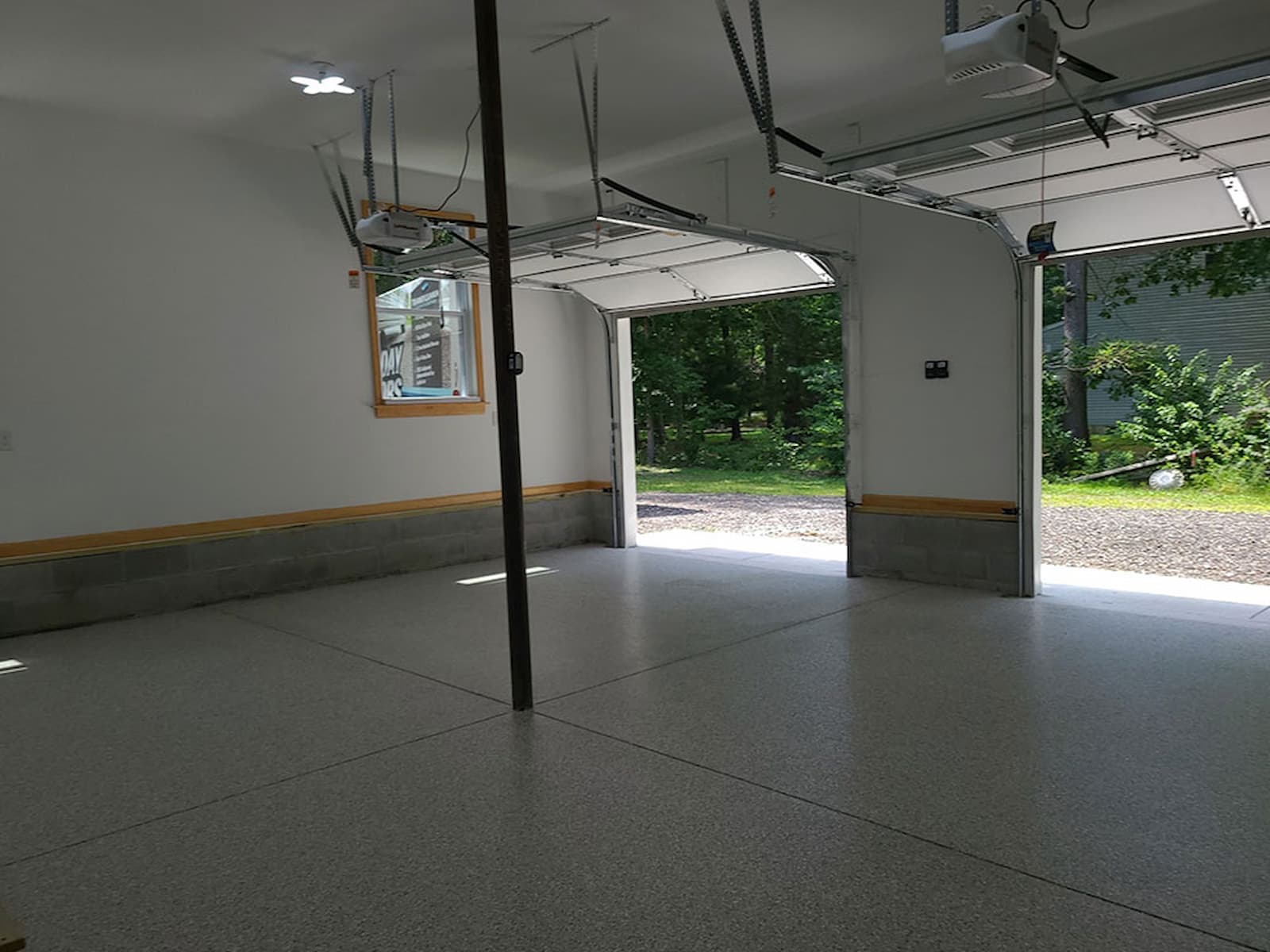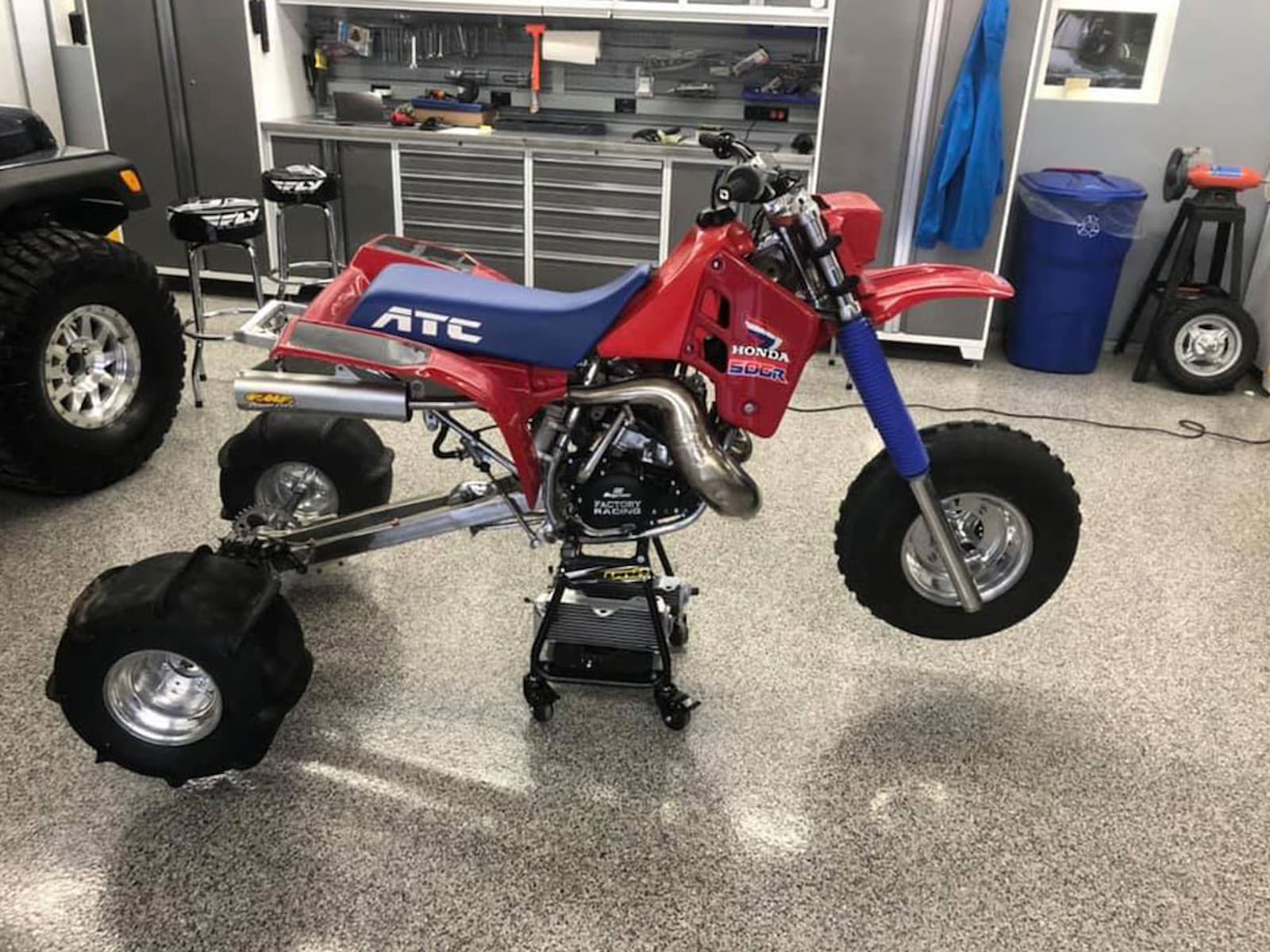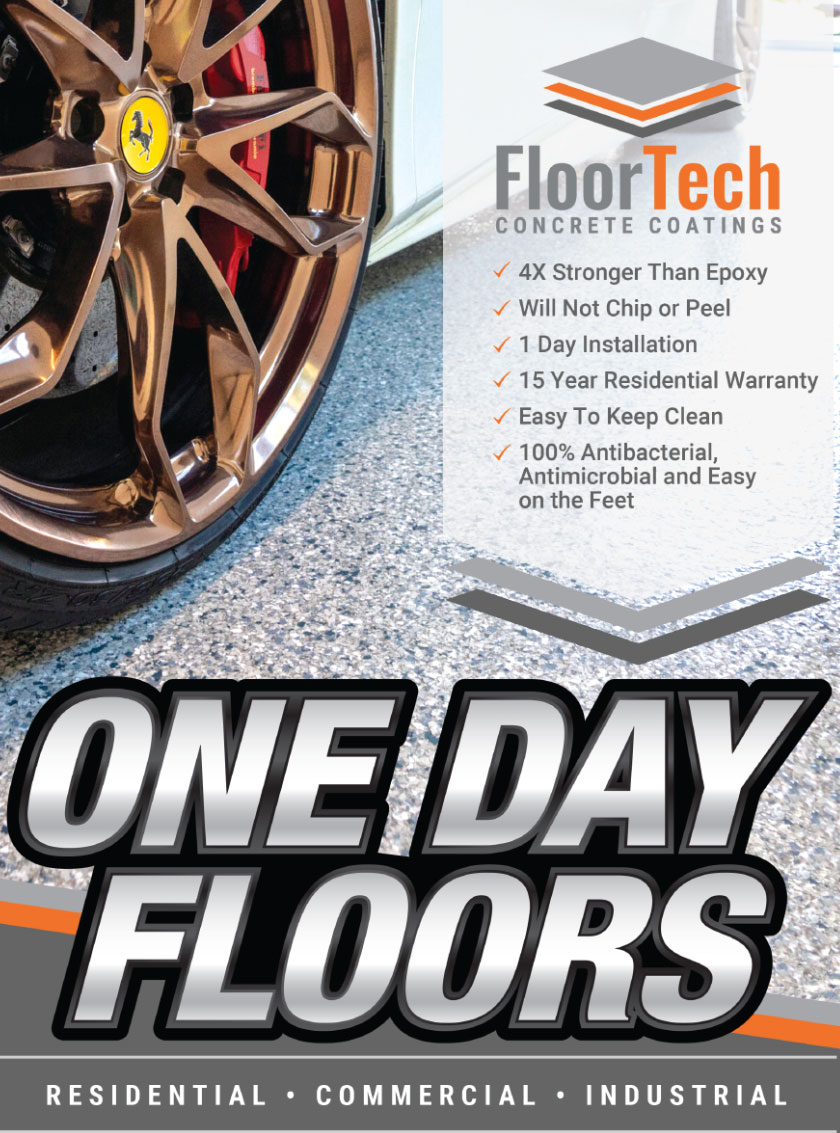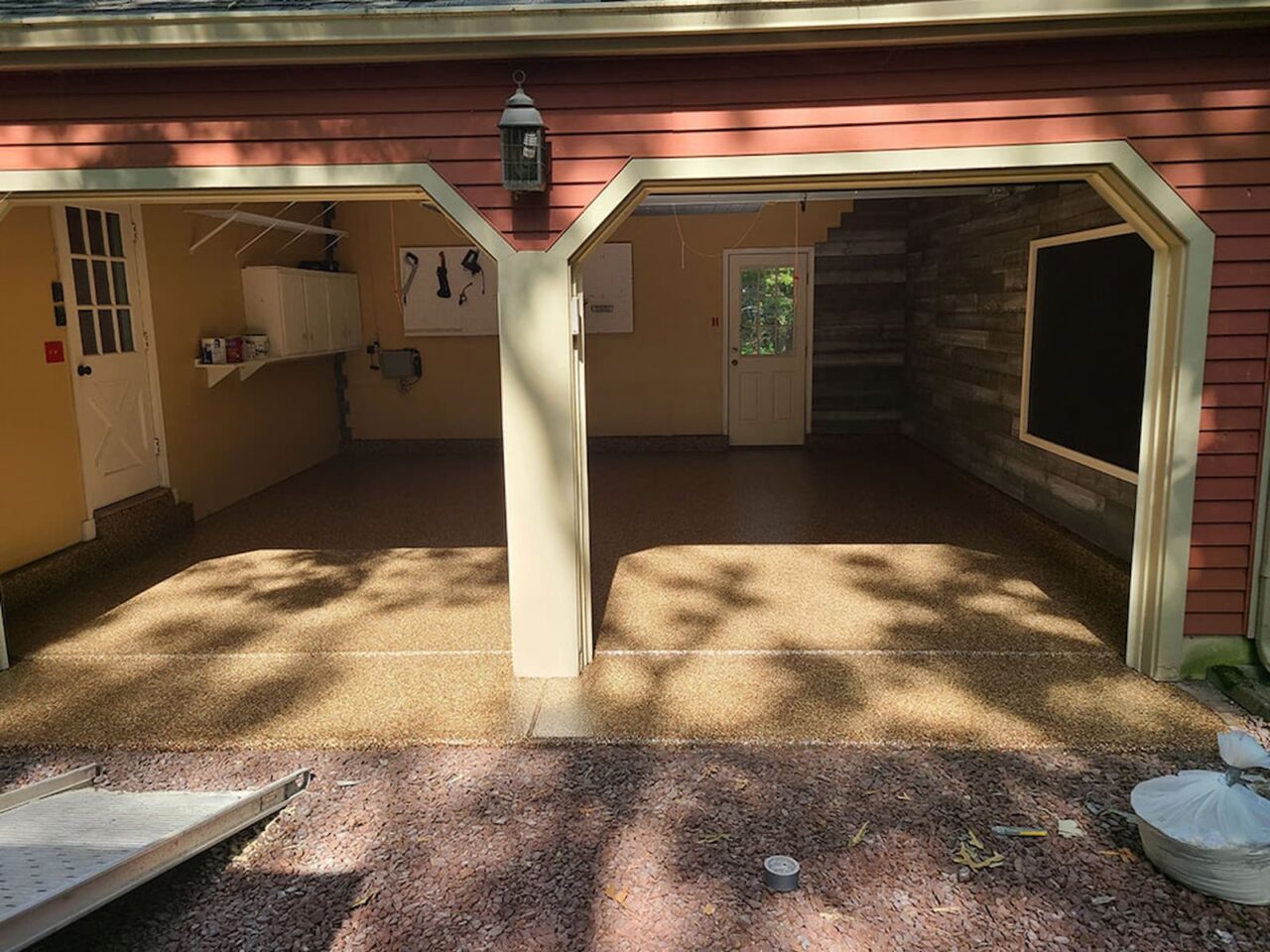When it comes to protecting and beautifying your garage, basement, or patio, you’ve probably heard about epoxy flooring. It’s been a go-to solution for years. But there’s a new contender in town that’s making waves—polyurea floor coating. If you’re wondering how polyurea stacks up against epoxy, you’ve come to the right place. At FloorTech Concrete Coatings, we know the ins and outs of both, and we’re here to break it down for you.
In this blog, we’ll explore the key differences between polyurea and epoxy floor coatings, looking at everything from durability to UV resistance to how they handle moisture. Let’s dive in and help you decide which option is the best fit for your space!
Aesthetic Appeal: How Polyurea and Epoxy Transform Your Floors
Whether you’re transforming your garage, revamping your basement, or upgrading your patio, both epoxy and polyurea floor coatings can elevate the look of your space. However, they differ in how much they can actually do for the visual appeal.
- Epoxy Flooring: Epoxy coatings are known for giving floors a glossy, professional look. However, they’re more limited when it comes to covering imperfections. Cracks, chips, or uneven surfaces will still show through after applying epoxy, as it doesn’t have the ability to fully smooth out significant flaws. Still, epoxy can give a nice facelift to worn-out floors, making them appear cleaner and more polished.
- Polyurea Flooring: This is where polyurea shines. Polyurea provides a broader range of color options, allowing you to perfectly match the coating with your interior or exterior décor. Not only does polyurea offer aesthetic versatility, but it can also hide imperfections better than epoxy, creating a more even surface that looks fresh and modern.
If looks are a big factor for you, polyurea’s variety and ability to cover surface flaws make it a top contender.

UV Resistance: Keeping Your Floors Looking New Over Time
Let’s face it: UV exposure is a big concern for outdoor spaces or garages that get a lot of sunlight. Both epoxy and polyurea can start off looking great, but how well do they hold up over time when exposed to UV rays?
- Epoxy and UV Exposure: One of the biggest drawbacks of epoxy flooring is its poor UV resistance. Over time, exposure to sunlight can cause epoxy floors to yellow or fade, leaving your space looking worn and dated. This isn’t ideal if you’re looking to maintain that clean, fresh appearance for years to come.
- Polyurea and UV Stability: Polyurea, on the other hand, is UV-stable. This means that no matter how much sun exposure it gets, it won’t fade, discolor, or yellow over time. It stays looking vibrant and new, even in areas with lots of sunlight. So, if you’re coating a patio or a garage that sees plenty of daylight, polyurea is the better option for long-term appearance.
Durability: Which Coating Stands Up to the Wear and Tear?
When it comes to floor coatings, durability is a big deal. After all, you need a surface that can handle everything life throws at it—whether it’s cars, heavy equipment, or just daily foot traffic. Here’s how polyurea and epoxy measure up.
- Epoxy Durability: Epoxy is known for being tough, but it has its limits. It does a decent job of protecting your floors from wear and tear, but it can struggle with heavy traffic, moisture, and pests. Additionally, epoxy can become brittle over time, making it prone to cracking, especially if there are significant temperature fluctuations. If your garage or basement experiences a lot of changes in temperature, this can be a concern.
- Polyurea Durability: Polyurea is nearly five times stronger than epoxy, making it a powerhouse in the durability department. It’s incredibly resistant to impacts, abrasions, and skids, which means it can handle heavy vehicles, dropped tools, and just about anything else you throw its way. Not only is it more resistant to physical damage, but it also acts as a moisture and pest barrier, which is something epoxy can’t quite compete with. If you want a coating that will last for over a decade without losing its strength or appearance, polyurea is the way to go.
Flexibility and Temperature Resistance: Handling the Heat (and Cold)
Temperature changes are another factor to consider, especially in garages or outdoor areas where concrete tends to expand and contract with the weather. So, how do these two coatings perform when it comes to flexibility?
- Epoxy’s Lack of Flexibility: Unfortunately, epoxy is not very flexible. It doesn’t handle temperature fluctuations well, meaning that when your home’s foundation expands or contracts with seasonal changes, the epoxy coating won’t move with it. Over time, this can lead to cracks and damage in the coating, reducing its lifespan and effectiveness.
- Polyurea’s Flexibility Advantage: Polyurea, on the other hand, is 98% more flexible than epoxy, which makes a huge difference when it comes to withstanding temperature changes. Its elasticity allows it to move with the concrete, preventing cracks and keeping your floor in great shape even when the temperature rises or falls. This makes polyurea an ideal choice for regions with extreme weather or significant temperature variations.

Moisture Protection: Keeping Your Floors Safe from Water Damage
Moisture can wreak havoc on concrete floors, causing coatings to delaminate or peel over time. If your garage or basement tends to be damp, this is definitely something to think about when choosing a floor coating.
- Epoxy’s Struggles with Moisture: One downside to epoxy is that it doesn’t handle moisture well. If there’s any moisture vapor transmission from underneath your concrete slab, it can cause the epoxy coating to peel or bubble. In spaces with high moisture levels, epoxy might not provide the long-lasting protection you need.
- Polyurea’s Superior Moisture Resistance: Polyurea offers far better moisture protection. It forms an impenetrable barrier that resists water vapor and prevents moisture-related damage. So, if you’re coating a garage or basement that tends to be a little damp, polyurea is your best bet for ensuring a long-lasting finish.
Slip Resistance: Safety First with Polyurea and Epoxy
Slippery floors can be dangerous, especially in areas that are prone to getting wet—like garages and patios. Both polyurea and epoxy can help create safer surfaces, but they do it in different ways.
- Epoxy and Slip Risk: While epoxy coatings are smooth and create a glossy finish, this can sometimes work against you. If the floor gets wet (think oil spills or rainwater), epoxy can become quite slippery, increasing the risk of falls.
- Polyurea’s Slip-Resistant Chip System: Polyurea coatings, however, often come with a slip-resistant chip system, making them much safer in wet conditions. The textured surface provides extra grip, reducing the chances of slipping, even when the floor is wet. This makes polyurea a great choice if safety is a priority, especially in high-traffic areas or spaces prone to moisture.
Longevity: Which Coating Stands the Test of Time?
Nobody wants to install a new floor coating only to have to replace it a few years later. So, which option will give you the most bang for your buck in the long run?
- Epoxy’s Shorter Lifespan: While epoxy can last for a few years, it’s not uncommon for it to show signs of wear sooner than you’d like. Between cracking, yellowing, and potential moisture damage, epoxy floors may need to be reapplied more frequently.
- Polyurea’s Extended Lifespan: Polyurea, on the other hand, is designed to last. With its extreme durability, flexibility, and resistance to moisture, UV damage, and temperature changes, polyurea floors can last over a decade without significant signs of wear. In fact, once installed, a polyurea floor coating is one of the longest-lasting options on the market, giving you peace of mind for years to come.
Ready for Polyurea? FloorTech Concrete Coatings Has You Covered
When it comes to choosing between polyurea and epoxy, the facts are clear: polyurea floor coatings offer superior durability, flexibility, UV resistance, and moisture protection. It’s the clear choice for homeowners who want a long-lasting, low-maintenance solution that looks great and performs even better.
At FloorTech Concrete Coatings, we specialize in installing polyurea floor coatings that can transform your garage, basement, or patio in just 24 hours. Contact us today to learn more about how polyurea can make a difference in your space!
Want to see how polyurea can transform your flooring? Reach out to FloorTech Concrete Coatings for a consultation and get your new floor installed in no time!







